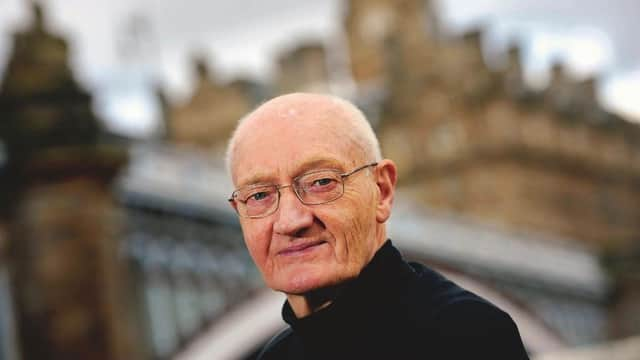Book review: Stories We Tell Ourselves, by Richard Holloway


A couple of years ago Richard Holloway offered what seemed as if it might be his final word. He called it Waiting for the Last Bus. Happily no word has ever been final for him – there has always been a “but.” In any case, the bus hasn’t arrived. He is still waiting at the stop, or in the shelter which offers little protection from the winds of the world.
Anyone reading this review probably knows that Holloway was the Bishop of Edinburgh in the Scottish Episcopal Church, an independent-minded one who lost, not quite his faith, but certainty, and confessed to agnosticism. There are two kinds of agnostics: those who say “I don’t know and I don’t care” and those who don’t know but still care and search. Holloway is in the second group. He doesn’t know but he still searches. “There is more faith in honest doubt, / Believe me than in half the creeds.” Holloway might go further than Tennyson and say “in any creed.”
Advertisement
Hide AdNevertheless, he might add – for he is, in the Scottish style identified by Muriel Spark, a “nevertheless” man – all creeds have their origin in puzzlement and a sense of wonder, and seek to make a statement of truth. Such truths, though presented as undeniable, may more properly be understood as myths, explanations of the inexplicable. They are, as his title has it, the stories we tell ourselves. Sometimes the stories are harsh: the myths of “The Fall“ and “original sin” for instance. Sometimes they are comforting: the promise of Paradise and the “band of angels …coming for to carry me home.” Sometimes the idea of Paradise is translated to this life and this world: the creation of the perfect society here on earth. It is never made but the idea of it persists.
“Whether we like it or not,” Holloway writes, “uncertainty seems to be ingrained in the nature of the universe.” We know much more about the universe than any previous generations have known. We can’t even pretend that it’s anthropocentric. Moreover, on account of this ingrained uncertainty, “we can never predict the impact on a human life of events at its earliest or subatomic level. Yet, conscious of our ignorance, we still seek certainty.”
In the last chapter of this book Holloway arrives at the position he has argued and felt himself towards; one in which he seeks “to try to live by the story of the magnificent defeat of Jesus, the godforsaken revolutionary.” He admits that “the Church never really tried to live the Jesus-life,” though, one might add, many individuals and even groups of Christians have attempted to do so, at least until they constituted themselves a church. But he recognises the paradox: that without a church – the church – this “Jesus story” and the “Jesus-life” it teaches, would have withered, died, and been lost in the black hole of history. “What the Church did was to keep his story alive. Even as they shifted uncomfortably in their seats, Christians were compelled to listen to it.”
Holloway’s journey has been difficult. Long ago he rejected the comfort of certainty. He has denied much that he was taught. He has been proudly disobedient, while at the same time conscious of the damaging self-satisfaction of proud disobedience, its denial of humility, its insistence that his private judgement was right and the judgement of his church wrong. Presumptuously I would guess that he is a proud man who would like to be a humble one, and finds this beyond him. He hasn’t however drifted so far as to arrive on the cold shore of atheistic materialism, whether simple or dialectical. “Faith unfaithful” has kept him “falsely true” and so he “remains” – or perhaps is again – “a member of the Christian Church... part of the community that keeps the dangerous memory of Jesus alive in history.”
There is much in this book to make you think, much to provoke argument for and against. Happily he is still there at the bus-stop, the bus not yet in sight. So this may not be his last word. If it is, it’s a good one to depart on, but one can’t think that the door to Doubting Castle hasn’t been slammed shut.
Stories We Tell Ourselves, by Richard Holloway, Canongate, 249pp, £16.99
A message from the Editor:
Advertisement
Hide AdThank you for reading this story on our website. While I have your attention, I also have an important request to make of you.
With the coronavirus lockdown having a major impact on many of our advertisers - and consequently the revenue we receive - we are more reliant than ever on you taking out a digital subscription.
Advertisement
Hide AdSubscribe to scotsman.com and enjoy unlimited access to Scottish news and information online and on our app. With a digital subscription, you can read more than 5 articles, see fewer ads, enjoy faster load times, and get access to exclusive newsletters and content. Visit https://www.scotsman.com/subscriptions now to sign up.
Joy Yates, Editorial Director